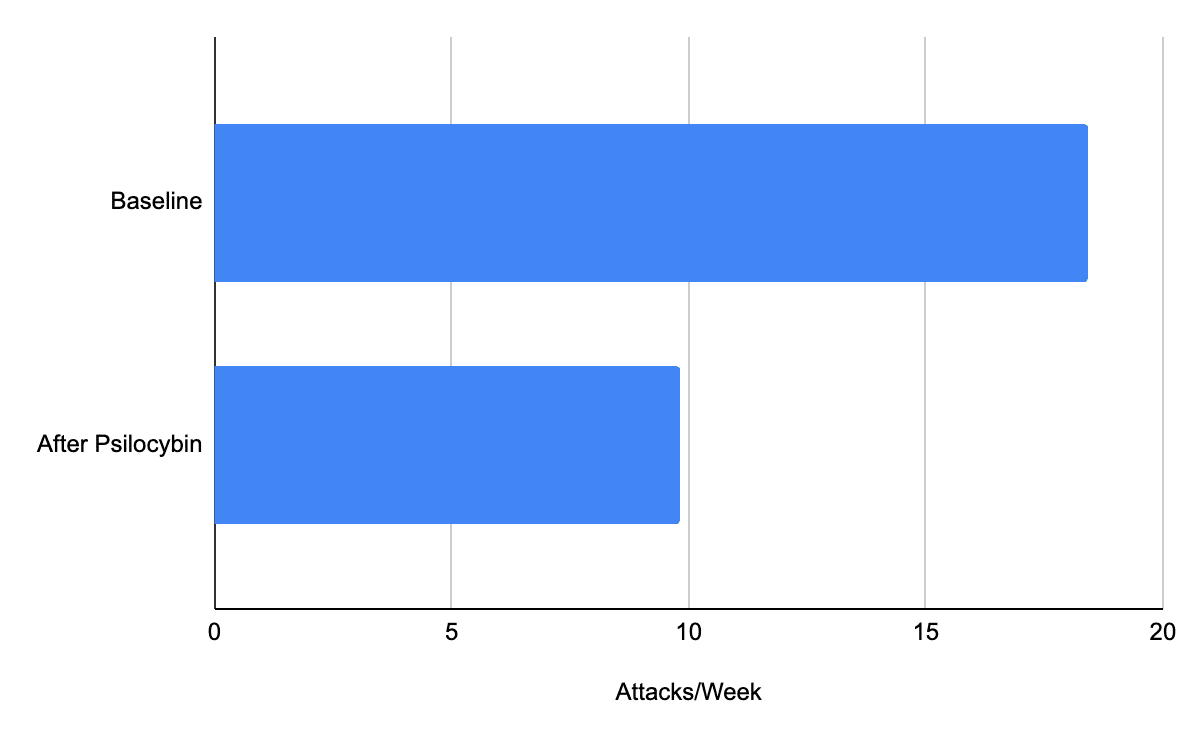A new study shows that repeated, low-doses of psilocybin lead to a significant reduction in the number of cluster headache attacks.
After doing a 3-dose pulse regimen of low-dose psilocybin, cluster headache attacks went down from a baseline of 18.4 to 9.8 cluster attacks per week.
In the first phase of the study, 14 cluster headache participants were either given three 10mg/70kg doses of synthetic psilocybin five days apart, known as the “pulse regimen,” or a placebo. The results revealed a 30% reduction in headache frequency by those given psilocybin, and no change in those who were given placebo. 10 milligrams of synthetic psilocybin is approximately the same potency as 1 gram of dried psilocybe cubensis mushrooms.
The results of the second phase of this study, “Psilocybin pulse regimen reduces cluster headache attack frequency in the blinded extension phase of a randomized controlled trial,” have been published in the Journal of the Neurological Sciences and show positive, statistically significant outcomes.
Of the original 14 participants in the first phase, 10 qualified and took part in the extension of the study. Six people had chronic cluster and the other four had episodic cluster and were in cycle during the testing. The focus was to further examine the safety and efficacy of repeating the pulse regimen. All 10 participants received the pulse regimen of three 10mg/70kg doses of psilocybin, with none receiving a placebo.
Based on self-reports using headache diaries before and after the pulsing doses, here are the main findings:
-
- Cluster attack frequency reduced from an average of 18.4 to 9.8 cluster attacks per week, almost a 50% reduction.
- Initial response to a first pulse regimen of psilocybin, may not be predictive of response to a second pulse regimen. As is common with preventive or transitional headache treatments, continued or repeated treatment may be necessary to achieve maximal effect.
Both studies were led by Dr. Emmanuelle Schindler and took place at the Veterans Affairs Hospital in West Haven, Connecticut, an affiliate of Yale University School of Medicine. During a recent webinar, Dr. Schindler discussed pursuing further studies of psilocybin and cluster headache using functional MRI to research changes in the brain after psilocybin administration and specifically the hypothalamus, which is a key brain region for cluster headache. The biggest hurdle, she stated, is obtaining funding. To find out how you can contribute to research funding opportunities including participating in the annual #CureforCluster 5k, visit the Get Involved page.
Statement from Bob Wold, Founder and Executive Director of Clusterbusters:
“It’s great to see science catch up with what I and the cluster headache community have known for more than 20 years – psychedelics are an amazingly effective treatment for cluster headache. This new data confirms that the effect of psilocybin is statistically significant in reducing the frequency of cluster headache attacks. Clusterbusters is committed to educating and supporting people living with cluster headache in safely and responsibly using psychedelics as medicines. We thank Dr. Schindler and her coauthors for doing this research. We call on policymakers at the federal and state levels to make psychedelic medicines legally available for our community.”
Any reporters interested in interviewing Bob Wold can reach him at Bob@Clusterbusters.org.
